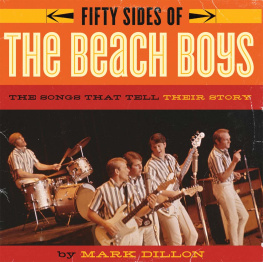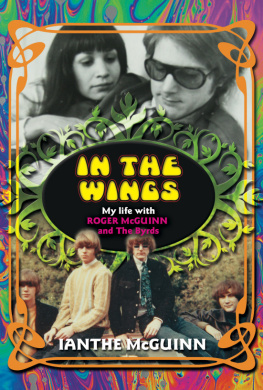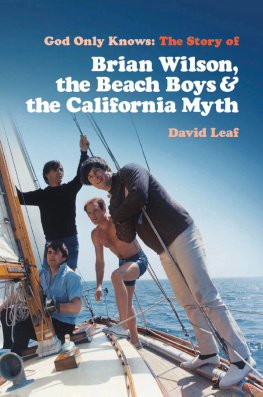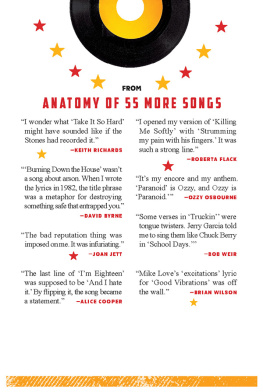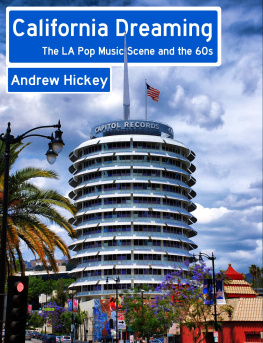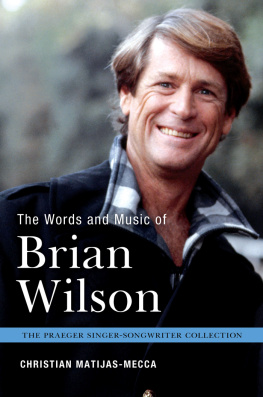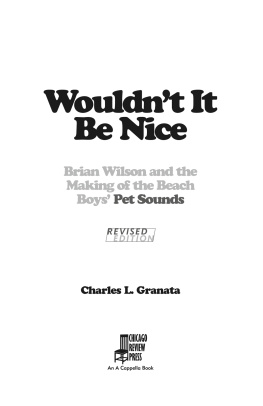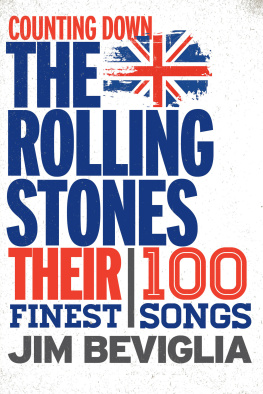preface
The Beach Boys have assumed the title of Americas band, and why not? Their success on the Billboard charts puts them ahead of all challengers: top singles, including four number ones; top albums, including two number ones. Theyve sold a purported millionplus records and played before countless fans worldwide including nearly 2,000,000 in just one day. Rolling Stone ranked them the twelfth greatest artists of all time. They were inducted into the Rock and Roll Hall of Fame in 1988 alongside The Beatles, Motown founder Berry Gordy Jr., The Supremes, The Drifters and Bob Dylan, and received a Grammy Lifetime Achievement Award in 2001 .
As the bands surviving members marked their th anniversary with the international Celebration tour and a new album, its past was one well worth honoring. But its not just history: the music remains as fresh and heartfelt, innocent and sophisticated, as it did when it first came over the airwaves. And the groups impact on popular culture transcends the beautiful sounds it created. The Beach Boys songs have enhanced the reputation of their home state of California as the playground of the young, helping forge an image that continues to hold sway around the world.
The group first cast its spell on me when I was seven, around the time I witnessed Bruce Jenners gold-medal decathlon performance at the 1976 Summer Olympics in my hometown of Montreal. I had no musical favorites, but that changed when my -year-old cousin Tracy slipped a pair of headphones over my ears and put on an 8- track tape of Best of The Beach Boys Vol. . I was captivated. The melodies, the harmonies the emotion in that music hooked me, and from then on every time I came over to my cousins house I would play Dont Worry Baby, California Girls, Help Me, Rhonda and I Get Around in a seemingly endless loop.
My family didnt own an 8- track player, but I then realized what our record player was for. I convinced my parents to buy me The Beach Boys 20 Greatest Hits LP I saw advertised on TV, featuring those songs I loved and more from their initial 1962 1965 creative spurt. Then I got Good Vibrations Best of The Beach Boys , which focused on the more esoteric ensuing years. I couldnt get a handle on the intricacies of Surfs Up and Heroes and Villains, but I loved most of the other songs. Then there was Beach Boys 69 (a.k.a. Live in London ), which documented the excitement of the bands concerts.
And soon I would get a chance to see them for myself. They were coming to the Montreal Forum on July , 1979 , and all I knew was I had to go! My mother wasnt keen about me going to my first rock concert, but Tracy agreed to take me and assured my mom she would hold my nose if any errant marijuana smoke wafted in our direction. What I remember most about that show was Brian Wilson, who sat at the piano at the side of the stage, very much in his own world, more interested in smoking cigarettes than playing. I had seen stories on TV about Brian and his return to the band after a self-imposed retreat, but couldnt really understand the fuss. I didnt care who had written all those great songs; I only cared who sang them! I still had a lot to learn about The Beach Boys.
My education began soon afterwards. As a thank-you for my parents having bought her ticket, Tracy gave me David Leafs 1978 Brian biography The Beach Boys and the California Myth . It was way over my head, but I held onto it and revisited it frequently over the years. To me and most of the world, The Beach Boys sang about surfing, cars and the girls on the beach. But Leaf discussed at length their introspective and acclaimed Pet Sounds album, and even more fascinating were the chapters about its aborted follow-up Smile . My fanaticism was further fueled.
And over the years it remained solid. I grabbed every band-related record, magazine article, book and video I could find. But I do recall that when I was in CEGEP (the Quebec equivalent of junior college in the U.S.) I kept my fondness for the group under wraps. It just seemed so uncool to like them. One day I brought some Beach Boys records to school for a friend who had asked to borrow them, and I freaked out when he pulled them out of the opaque bag Id put them in. I didnt want anybody to see. But that self-consciousness quickly passed, and with a Brian Wilson comeback in 1988 another one, this time as a solo artist and the later rediscovery of the groups back catalog on CD, many others got hip to The Beach Boys.
I always had wanted to write a book about the group, and after a decade as an entertainment journalist in Toronto, I finally decided to do it. Aptly enough, the idea came to me on the beach. Mind you, not in Del Mar or Manhattan Beach or any of the legendary locations name-checked in Surfin U.S.A., but on the significantly chillier shores of Lake Huron. The bands forthcoming th anniversary provided a perfect opportunity for reflection, and I figured what better way to mark the occasion than have people discuss a Beach Boys song thats somehow meaningful to them. In this book, band members except, sadly, Brians younger brothers Dennis and Carl, both long gone and key collaborators provide eyewitness accounts of the bands evolution and the creation of its most memorable records. The Beach Boys contemporaries recall the musics initial impact, while modern-day artists explain its continuing influence. Finally, fellow authors reveal how a song inspired them to explore The Beach Boys saga.
I conducted the interviews from September , 2009 , to July , 2011 . They were done expressly for this book, except for my Brian interview, which was for an August , 2010 , feature in Canadian newsweekly Macleans . Most of the interviews were conducted over the phone, while Peter Bagge, Scott McCaughey and Cameron Crowe communicated via e-mail. I spoke in person with Darian Sahanaja prior to a Brian show at Milwaukees Pabst Theater on October , 2009 , where I was introduced to Brian.
The number of people who have played a role in The Beach Boys story, plus the musicians and writers they have touched, quickly runs into the hundreds, so, inevitably, only a fraction are included. That is not to diminish the significance of those who are not. There are some missing voices that should be noted. Not accounted for is official member Ricky Fataar, who drummed, composed and produced for the band from 1972 to 1974 , but who did not respond to multiple interview requests. Brians first wife Marilyn Wilson-Rutherford, singer in Brian-produced girl groups The Honeys and Spring, and Van Dyke Parks, Brians Smile collaborator, replied in the sweetest way possible that they are largely stepping away from Beach Boys Q&As.
Each of those who did participate brings his or her unique point of view, the aim being to provide a broad and balanced perspective on the band. Using a light hand, I tried to guide which songs each would discuss, in an effort to include the most praised, popular and representative cuts of the groups career. Sometimes, the match of song to interviewee is obvious as he or she was directly involved in its creation or, as an outside artist, has covered the tune. Whatever the case, I wanted each interviewee to choose a track based on a strong connection. As a result, there are a disproportionately high number of selections from Pet Sounds , the Smile era and even Surfs Up , yet nothing from the worthy Carl and the Passions So Tough.
I have included one cut from Dennis Pacific Ocean Blue solo album, which garnered ecstatic reviews in 1977 and when rereleased in 2008 , and five from Brians solo career, which is where the story goes in terms of significant studio work from 1988 to 2012 , with The Beach Boys anniversary reunion album pending. And while may sound like a lot of songs, missing are such favorites as Little Deuce Coupe, Be True to Your School, The Warmth of the Sun, When I Grow Up (To Be a Man), Dance, Dance, Dance, Wild Honey, Friends, I Can Hear Music, Break Away, Cotton Fields, Add Some Music to Your Day and many more, which speaks to the depth of the bands catalog. There will be no shortage of material left to dissect on the groups centenary.

